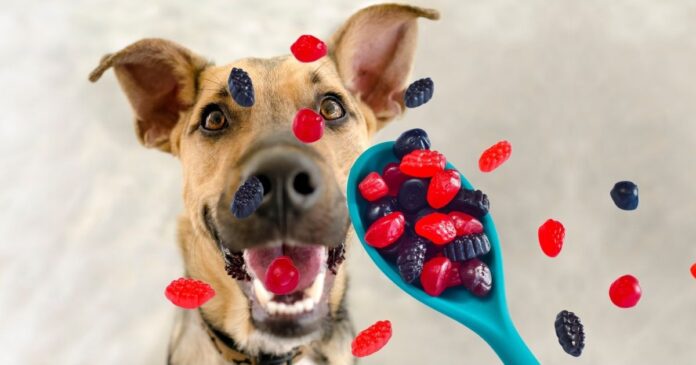Hey there, fellow pet parents! Ever caught your pup giving those colorful Motts fruit snacks the puppy-dog eyes? Well, I’ve been there too, and today we’re gonna dive deep into whether these sweet treats are safe for our four-legged friends.
The Quick Answer
No, dogs should not eat Motts fruit snacks While one or two pieces probably won’t cause serious harm to your dog, these snacks contain ingredients that aren’t good for your furry friend’s health
Why Motts Fruit Snacks Are Not Great for Dogs
The Problematic Ingredients
- Artificial Sweeteners
- Some fruit snacks might contain xylitol (though Motts typically doesn’t)
- Even regular sugar isn’t great for doggy tummies
- Can lead to dental problems and weight gain
- Artificial Colors and Preservatives
- Dogs don’t need these synthetic additives
- May cause digestive upset
- Could trigger allergic reactions in sensitive pups
- High Sugar Content
- Can cause tooth decay
- Might lead to obesity
- Could contribute to diabetes in dogs
What Happens if Your Dog Ate Motts Fruit Snacks?
Oh no! Did your sneaky pupper just gobble up some fruit snacks? Don’t panic! Here’s what you need to know
Common Symptoms to Watch For
- Upset tummy
- Excessive thirst
- Diarrhea
- Vomiting
- Lethargy
What to Do Next
-
Stay Calm
- Don’t freak out! Most dogs will be fine after eating a few fruit snacks
-
Check the Package
- See how many snacks your dog ate
- Look at ingredients list for anything concerning
-
Monitor Your Dog
- Watch for unusual behavior
- Keep an eye on their bathroom habits
- Check their energy levels
-
Contact Your Vet If:
- Your dog ate a large amount
- Shows signs of distress
- Has ongoing digestive issues
- Has pre-existing health conditions
Healthy Alternatives to Motts Fruit Snacks
Instead of giving your pup processed fruit snacks, try these pawsome alternatives:
Fresh Fruits (in moderation)
- Apple slices (no seeds)
- Banana chunks
- Watermelon (seedless)
- Blueberries
- Strawberries
Commercial Dog Treats
- Natural dried fruit treats made for dogs
- Freeze-dried fruit treats
- Dental chews
Tips for Preventing Future Snack Incidents
-
Store Safely
- Keep fruit snacks in closed cabinets
- Use high shelves
- Don’t leave packages unattended
-
Train Your Dog
- Teach “leave it” command
- Reward good behavior
- Establish boundaries around human food
-
Provide Alternatives
- Keep healthy dog treats handy
- Use puzzle toys for entertainment
- Regular exercise to prevent boredom eating
The Bottom Line
While your dog probs won’t need emergency care after sneaking a few Motts fruit snacks, it’s best to keep these sweet treats away from your furry friend. There are so many better, healthier options that’ll make both you and your pup happy!
Quick Do’s and Don’ts
Do:– Keep fruit snacks out of reach- Offer dog-safe alternatives- Contact vet if concerned- Monitor after accidental ingestion
Don’t:– Purposely feed fruit snacks to dogs- Ignore symptoms of distress- Assume all human snacks are safe- Wait too long to seek help if needed
FAQs About Dogs and Fruit Snacks
Q: Are fruit snacks toxic to dogs?
A: Most fruit snacks aren’t technically toxic, but they’re def not healthy for dogs. The main concerns are sugar content and artificial ingredients.
Q: What should I do if my dog ate a whole package?
A: Monitor them closely and contact your vet, especially if they’re a small dog or show any concerning symptoms.
Q: How long should I watch my dog after eating fruit snacks?
A: Keep an eye on them for 24-48 hours, looking for any digestive issues or behavior changes.
Q: Can fruit snacks cause long-term problems?
A: Regular consumption could lead to obesity, dental issues, and diabetes, but occasional accidental ingestion usually isn’t a long-term concern.
Wrapping It Up
Look, we all know how crafty our fur babies can be when it comes to getting their paws on human snacks. While Motts fruit snacks aren’t the worst thing your dog could eat, they’re definitely not something you wanna add to their regular diet.
Remember to keep those tasty treats stored safely away, and maybe stock up on some dog-friendly alternatives instead. Your pup’s tummy (and your vet) will thank you!
Stay pawsome, pet parents! And don’t forget to share this article with other dog lovers who might be wondering about their pup’s snacking habits!
Disclaimer: While this article is based on research and general knowledge, always consult your veterinarian for specific advice about your dog’s diet and health concerns.












